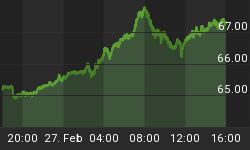In light of the mind-blowing lengths to which Wall Street has gone to minimize the importance of the enormous deficits posted in the fourth quarter current account and in January's monthly trade figures, I thought a simple analogy would be helpful in putting this situation into its proper perspective.
It is particularly timely in view of last week's jobs report, which reveled that another 240,000 Americans had found employment providing services and building houses. The growth in these sectors assures that future trade and current account deficits will be even larger, as these newly employed workers exchange the IOUs they earn for the real goods the rest of the world produces. However, recent government action blocking a Dubai company from purchasing U.S. ports, following similar actions which prevented a Chinese company from acquiring Unocal Corp. last year, may result in the world's producers finally reassessing the "wisdom" of exchanging real merchandise for American IOUs that can neither be redeemed for consumer goods nor assets.
The following analogy is a summation of one I used during my editorial workshop at the Orlando Money Show in February. To view a web cast of the entire 50 minute presentation, visit the following link and follow the instructions: http://www.moneyshow.com/channelms/login.asp?wid=3CF71C8F7AA34AD498C54FCF8
A Tale of Two Farmers
Farmer Chang only grows oranges. Farmer Jones only grows apples. Each grows only the fruit that he produces most efficiently, trading the surplus for the fruit grown by the other. Both farmers benefit from comparative advantage and free trade. The sole reason that Farmer Chang "exports" oranges is to "import" apples, and vise-versa.
Suppose that one year a frost wipes out farmer Jones' apple crop. Not having any fruit to trade, but hungry nevertheless, he proposes to trade apple IOUs for farmer Chang's oranges. Since Farmer Chang cannot eat all of the oranges he grew anyway, and since farmer Jones' IOUs will pay 10% interest (in extra apples of course) he agrees.
Farmer Chang only accepts farmer Jones' offer because of the apples that Farmer Jones' IOUs promise to pay. By themselves, the IOUs have no intrinsic value. Farmer Chang cannot eat them. It is only the promise to pay apples that gives them value.
Now suppose that the following year farmer Jones' crop is again destroyed, this time by a flood. He and Farmer Chang once again make the same deal, with Farmer Jones getting more of Farmer Chang's oranges, and Farmer Chang accepting more of Farmer Jones' IOUs.
Further suppose that similar natural disasters continue to besiege Farmer Jones for several more years, with Farmer Chang continuing to accept Farmer Jones' interest-bearing apple IOUs in exchange for his oranges. Eventually it dawns on Farmer Jones that he is eating pretty well, without actually farming. He therefore decides to turn his apple orchard into a golf course, and simply play golf all day while enjoying Farmer Chang's oranges. In other words, Farmer Jones now operates a "service economy."
Farmer Chang on the other hand is so busy growing all those oranges that he never gets a chance to play Farmer Jones' course. In fact, he has been accepting farmer Jones's IOUs for so long that he no longer remembers his original reason for doing so. He forgot about his original desire to actually eat the real apples Farmer Jones had promised to deliver. Instead, he now counts his wealth based solely on his accumulation of apple IOUs. In fact, Farmer Jones had such a good reputation within the farming community that Farmer Chang was actually able to trade some of Farmer Jones' IOUs for goods and services provided by other farmers and local merchants. Apparently no one bothered to notice that Farmer Jones' apple orchard had become a golf course, and that his IOUs were therefore worthless, as he no longer possessed the ability to redeem them with actual apples.
Some might argue that the entire community now depends on Farmer Jones and his worthless IOUs and that everyone will accept them indifferently rather than acknowledging the reality of their folly. Of course, were these revelations to occur, any unfortunate holders of Farmer Jones' IOUs would officially be forced to realize their losses. However, their true financial situations would improve, as any further accumulation of worthless IOUs would end. As for Farmer Chang, he would literally once again enjoy all of the fruits of his labor.
The real loser of course would be Farmer Jones, for without a viable apple orchard or the ability to buy oranges on credit, he would starve. It would take years to transform his golf course back into an orchard, regain his lost knowledge of farming, and replace his obsolete or dilapidated farming equipment (provided he hadn't already traded it in for golf carts and titanium clubs). In the end, his only alternative might be to sell his golf course to farmer Chang and take a job picking fruit in his orange grove.
Do not wait for all the Farmer Changs to come to their senses and end up picking someone else's fruit. Protect your wealth before it's too late. Discover the best way to buy gold at www.goldyoucanfold.com, download my free research report on preserving your purchasing power through foreign equities available at www.researchreportone.com and subscribe to my free, on-line investment newsletter at http://www.europac.net/newsletter/newsletter.asp.















